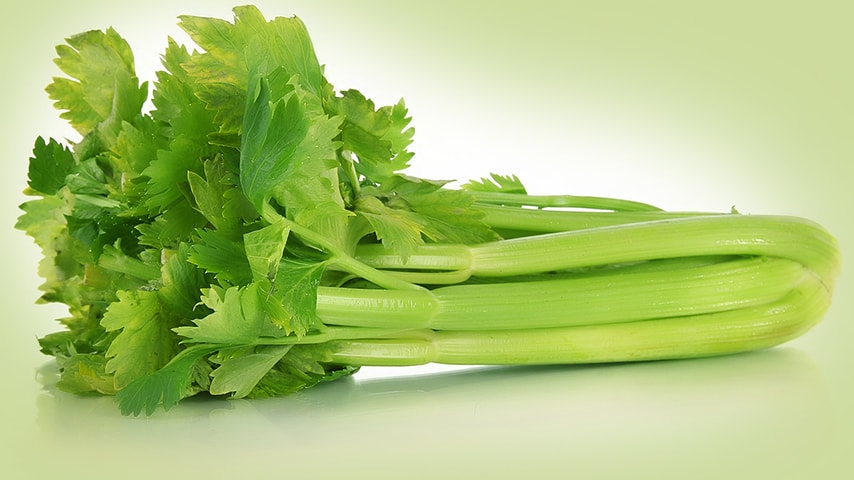
Celery fruit: A home remedy for Kidney stones
"A glassful of celery juice a day keeps the kidney stone away", is what can be said about celery fruit as it has diuretic properties that clears the body from toxins and prevents from kidney stone formation.
Introduction
Celery is a fruit that has been used for its medicinal value for thousands of years. Ayurveda describes it as Shikhi Moda meaning a plant that is useful in digestive disorders like flatulence. In Ayurveda celery seeds have been used to treat colds, flu, oedema, poor digestion, different types of arthritis, and certain diseases of the liver and spleen. The importance of celery fruit (seeds) has become known to western world recently but it has been used in different parts of the world for a long time.
Preventive Use
Celery is a food with practically low calories and hundred benefits. If consumed daily in moderation it keeps you healthy because of being rich in antioxidants. Celery is beneficial for the digestive tract and cardiovascular system as well. It also has diuretic anti-arthritic properties and provides a relief in rheumatism and gout. If you are having only celery for the lunch you need not worry as it has all nutrients, vitamins and minerals in balanced proportion. Celery seed oil has a regulating effect on nervous system. It has also been used for its stimulating effect on the sexual desire.
Curative Use
Celery seed is very effective as a diuretic, meaning it helps body to get rid of too much water by increasing urine outflow. It is also beneficial for reducing swelling and oedema. Celery promotes the healthy functioning of the kidney by increasing urine outflow and clearing the body of toxins. In this way it also prevents kidney stone formation.
For kidney stones have a glassful of celery juice daily in the morning.
Medicinal Uses
Celery can help you in number of ways. The health benefits of celery are as follows-
- Insomnia: One teaspoon full of honey and celery juice, if taken once before going to bed helps relieve insomnia.
- Indigestion: Celery seed 1 tsp soaked in a glass of buttermilk for 5-6 hours and finely ground helps to treat indigestion.
- In coughs, respiratory problem and hiccups: Powder or smoke is used.
- Swelling and oedema: Celery root acts as a rasayana and acts as diuretic which helps in alleviating the oedema of whole body.
- Hypertension: Celery seed extracts have constituents like phthalides that act as antihypertensive agents which causes relaxation of smooth muscles of arteries and are useful in the chronic treatment of elevated blood pressure.
- Anticarcinogenic: Celery has some flavonoids that possess anti-cancer properties. Luteolin suppresses the growth of cancer cells especially in pancreas. Regular intake of celery could significantly delay the formation of breast cancer cells. These flavonoids are also beneficial in treating joint pain, lowering BP, calming effect on nervous system.
- Decreases cholesterol: Celery juice helps in lowering cholesterol. Component Butylphthalide in celery helps lowers cholesterol.
- Hyperacidity: Celery juice also helps in neutralizing acidity.
- Natural laxative: Celery has natural laxative properties.
- Pain abdomen: Celery powder taken with hot water gives relief in abdominal pain.
- Blood mixed diarrhoea (अतिसार): In this case ajmoda mixed with ghee, milk, honey and sharkra is used.
Precautions
- Pregnant women should restrict use of celery seed because of its garbhasankochak (cause contraction of uterus) as it may lead to uterine bleeding and muscle contractions in the uterus, which could cause abortion.
- Use of celery stems and seeds can cause photosensitivity which means the skin becomes very sensitive to the sun's UV rays.
- If you are already on diuretics try avoiding celery seeds as it also acts like a diuretic, so it could make the effects of these medications raising the risk of dehydration.
Dose
- Parts used: Fruit (seed) and roots
- Dose: Powder: 1-3 grams, maximum - 5 gram, Arka - 10-50 ml
Ayurvedic explanation
- Hindi name: Ajmod (अजमोदा)
- Sanskrit name: Ajmoda (अजमोदा)
- Rasa (रस): Katu (कटु), Tikat (तिक्त)
- Guna (गुणवत्ता): Laghu (लघु), Ruksh(रुक्ष)
- Virya (वीर्य): Ushna (उष्ण)
- Vipaka (विपाक): Katu(कटु)
- Doshkarm (Pharmacological action): Kaphavatashamak (कफ़वातशामक)
Modern scientific explanation
- Botanical name: Apium leiophyllum (source - A.P.I)
-
Chemical constituents: Essential oil and fixed oil, compound of ketone. Roots and leaves contain valuable amino acids, carotene, tyrosine, nicotinic acid and essential oils. Apiol gives celery the specific taste.
- Celery seeds contain several substances including volatile oils, flavonoids, antioxidants that give plants their colours and may protect cells from damage; coumarins, chemicals that help in thinning of the blood and linoleic acid, an omega-6 fatty acid.
- Celery calms the nerve because of the high calcium content & helps in controlling high blood pressure. Raw celery should be eaten to reduce high blood pressure.
- Celery leaves has high content of vitamin A, whilst the stems are an excellent source of vitamins B1, B2, B6 and C with rich supplies of potassium, folate, calcium, magnesium, iron, phosphorus, sodium and plenty essential amino acids.
- Hippocrates believed that people with damaged nerves need to consume a lot of celery.

Add a comment